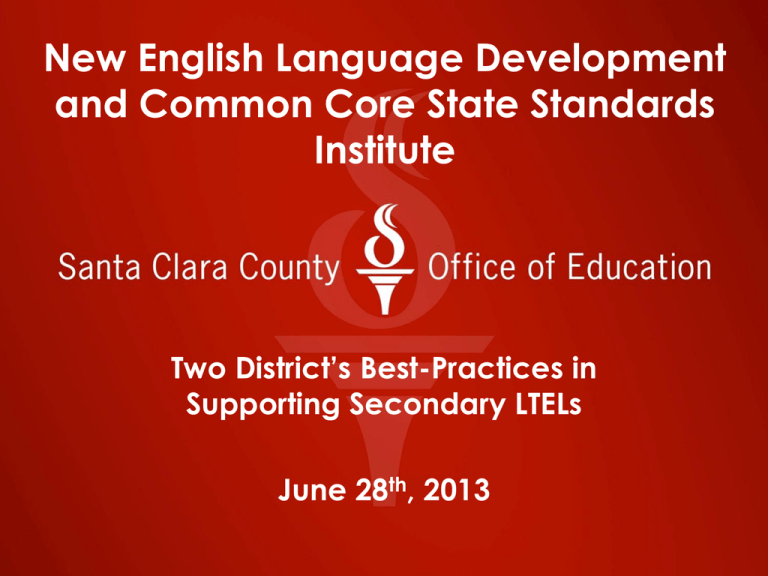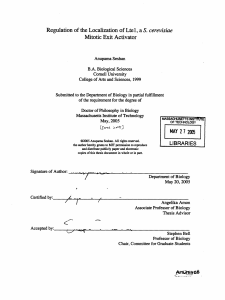Rachel and Irma A IV Part 1
advertisement

New English Language Development and Common Core State Standards Institute Two District’s Best-Practices in Supporting Secondary LTELs June 28th, 2013 Introductions Mills High School San Mateo Union High School District Rachel Mack Irma Muñoz Academic Support Counselor Assistant Principal 2 Goal Prepare every English learner for college and career success! 3 Objectives Workshop participants will: • Attain new ideas for programs that raise achievement for secondary LTEL students • Evaluate current LTEL programs at school sites • Develop ideas for next steps at school sites 4 Demographics at Mills White 19% African American 1% Pacific Islander 2% Latino 15% Asian 55% Filipino 8% 5 Demographics at Mills Number Percentage English Learners 101 8% Free/Reduced Lunch 204 16% Special Education 112 9% 6 Percentage of EL’s at Mills 32% Reclassified Fluent 60% Fluent 1% Intermediate ELD 7% Mainstreamed EL 7 EL Categories Mainstreamed Non-LTEL 45% Intermediate English Learners 15% Long-Term English Learners 40% 8 Achievement Data CST English Language Arts 2012 Percent Proficient or Above Schoolwide 75% English Learners 23% CAHSEE English Language Arts 2012 Pass Proficient Schoolwide 95% 77% English Learners 78% 28% 9 Academic Performance Index (API) 880 860 865 870 852 840 820 800 780 2010 2011 2012 Schoolwide 10 Academic Performance Index (API) 880 860 840 865 870 852 837 820 800 787 790 780 2010 2011 Schoolwide 2012 English Learners 11 Sample Student “Santiago” Latino Male Low-Income SPED Low Grades & Test Scores 12 Root Challenges SocialEmotional Issues Low Skills Low Motivation 13 Pyramid of Interventions All Students Some Students Drop-In After-School Tutoring Subject-Based Tutoring Parent Outreach for Long-Term English Learners Drop-In Tutoring for English Learners Mandated After-School Tutoring English & Math Support Classes Guided Study Classes EL Intensive Tutoring Group Counseling Individual Counseling SST’s Individual 504 Plans Students SPED More Intensive Less Intensive Identification of LTEL’s • LTEL students tracked in Student Information System • Teachers given lists of LTEL students in August • D/F lists for counselors indicate LTEL status 15 Support Classes • Strategic English Support • Strategic Algebra Support • Guided Studies 16 After-School Tutoring • Drop-In Tutoring for EL Students • EL Intensive Tutoring (1 tutor per 2 students) 17 Academic Counseling • EL Specialist • Academic Support Counselor • Guidance Counselors 18 Academic Support Groups • Study Skills Groups • Brainology®: Growth Mindset Program 19 Parent Outreach • LTEL Parent Workshops • Latino Parent Night 20 Additional Support Programs • Latina Mentor Program • Individual Counseling with Interns • English Learner Advisory Committee 21 Other School District Programs • • • • • • Intensive English Support Courses Spanish Courses for Native Speakers PIQE Parent Education Program Freshman Buddy System Family Literacy Night CELDT Assembly 22 EL Intensive Tutoring Outcomes GPA Data 4 3.5 88% of students increased GPA Average GPA 3 2.5 29% GPA increase 2 1.5 1 1.96 1.52 0.5 0 Before Intensive Tutoring After Intensive Tutoring 23 LTEL Parent Workshops • Average attendance of 7 to 12 families per workshop • 100% of parents surveyed reported that the workshops were valuable and informative • 100% of parents reported that the workshops would increase their ability better support their students’ success in school 24 Outcome Data Percentage of LTEL’s who qualify for reclassification to Fluent 2011 2012 25% 35% 25 Requirements for Reclassification • Score Early Advanced or Advanced on each section of the CELDT • Score 325 or higher on the English portion of the CST or pass the English portion of the CAHSEE • Have a GPA of 2.0 or higher • Be on track for graduation • Receive a teacher recommendation 26 Next Steps • EL Professional Development for faculty • Classroom Interventions – Link common core with EL student needs – Targeted language instruction – EL Curriculum 27 LTEL Intervention Program Stages Stage 1: Planning Stage 2: Identification & Ancillary Support Stage 3: Targeted LTEL Interventions Stage 4: School-Wide Strategies 28 Small Group Discussion Split into groups of 4 to 6 and discuss the following: 1. Where is your school currently on the LTEL Intervention Program Stages chart? What programs does your school currently offer that support LTEL (or EL) students? 29 Small Group Discussion 2. How might your school progress to the next stage of supporting LTEL’s? What are some growth areas? What are some ideas you could envision your school implementing? 30 Think-Pair-Share 3. What are TWO action steps that you as an individual can take next year to help further your school’s growth in supporting LTEL’s? 31 Questions? Comments? Thanks for coming! 32







